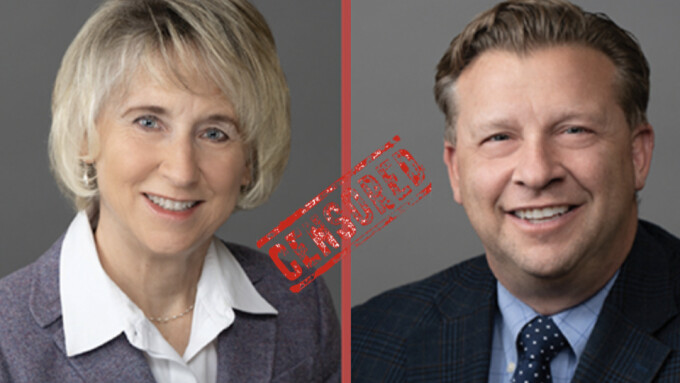SALT LAKE CITY — The two leading War on Porn crusaders in the Utah legislature, Rep. Susan Pulsipher and Senator Todd Weiler, in recent interviews celebrated their state’s pioneering role in developing anti-porn legislation and hailed their age verification initiative as the source of later copycat legislation.
Republicans Pulsipher and Wailer made their remarks while speaking with Salt Lake City Weekly reporter Matt Pacenza for an article surveying the effects of the state’s long-term crusade against adult content.
As XBIZ reported, Pulsipher and Weiler’s bill SB 287 was one of several anti-porn measures promoted in Utah by the Republican Party, which controls all branches of the state’s government. SB 287 became state law in May 2023, a few months after a similar age verification law went into effect in Louisiana, in January 2023.
Free Speech Coalition Executive Director Alison Boden wrote to Weiler at the time, arguing that the bill was “so vague — and the requirements for compliance so contradictory” that she could not figure out how FSC members could comply.
Weiler and Pulsipher’s bill, the Salt Lake City Weekly noted, created civil liability for adult content platforms, but “so far, no private Utah citizens have taken advantage of SB287 and filed a suit.”
Weiler told the paper that he had considered “a version of SB287 that would have given the attorney general a right to sue, but he decided it was less likely to pass the Legislature because it would have likely cost several million dollars in salaries for attorneys and support staff.”
“If I empowered the AG to go after them, it would have had a huge fiscal note,” Weiler added.
Pulsipher claims to have received much positive feedback from constituents.
“[It was] probably the most ‘Thank Yous’ of any stance I’ve taken or any bill I’ve run,” she told the Weekly.
Yes, You Can Still Easily Find Porn on Utah's Computers
To test the bill’s efficacy in Utah — one of the first states where Aylo made the decision to block access to Pornhub because of potential liability created by the vaguely written bill — the article’s author performed a cursory search for adult content, visiting the 20 most-visited adult sites as determined by Similarweb “from a computer in Salt Lake City using a home Internet connection with no filters installed.”
“Of the top 20,” Pacenza wrote, “10 could be accessed with no age verification or by simply clicking a button that says ‘Yes, I’m 18,’ but offering no proof. None of these are complying with Utah’s law.”
“Sites that are overseas may not feel the need to comply with U.S. law,” FSC’s Mike Stabile explained to Pacenza. “That’s one of the key flaws of this legislative approach.”
“Unsurprisingly,” the report revealed, “the sites with no age verification have seen a boost in traffic in Utah: Seven of the ten are up, and three of those have seen their traffic double.”
In recent years, Utah has often led other states in implementing anti-porn legislation, and Weiler is known as a staunch proponent of moralizing legislation, even compared with his peers in the notably religiously conservative Utah Republican Party.
In practice, the state has little separation between church, state, press, education and business, and the Mormon church — with which a majority of Utahns claim affiliation — has resisted scientific, evidence-based and parent-focused approaches to protecting children online.
Despite the national GOP’s laissez-faire philosophy regarding most business and regulatory issues, Utah’s Republican officeholders have relentlessly championed blanket mandates requiring default manufacturer-enabled filters or age verification systems.
The LDS Church has also promoted “porn filters” in Utah and nationwide, based on church elders’ theological belief that all porn — a term that for them encompasses all depictions of sexuality outside of the Mormon marriage — is a ploy by Satan to destroy Mormon households.
A Forever War That Continues Benefiting the Crusaders
“Are we winning the war against pornography?” Weiler asked rhetorically in the Salt Lake City Weekly piece. “No. Will we ever win it? Probably not. But that doesn’t mean we shouldn’t do what we can.”
The article points out that even though SB 287 and other culture war efforts by Pulsipher and Weiler have been “mocked by many progressive Utahns” for embodying the same “heavy-handed morality” that limits Utahns’ access to alcohol and lottery tickets, Utah’s approach toward pornography has nevertheless spread quickly across the country.
The article quotes Indiana University professor of media psychology Bryant Paul, who posits, “What we know works best for stopping the potential negative effects of this content is for parents to talk to their children openly.”
Pacenza concludes the article, however, by suggesting that “the real story behind porn” is reflected in “Hot Girls Wanted” — the highly controversial, sensationalizing 2015 documentary that Paul co-produced — and by giving Weiler the last word.
“We need to make it safe to talk about it,” Utah’s top anti-porn state senator told the Weekly. “They’re going to search for porn. They’re going to find it. And so we need to talk about it.”







